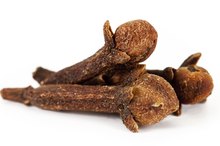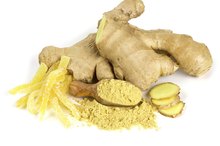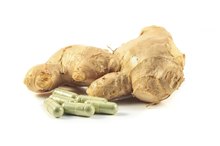Can Ginger Make You More Nauseous?
Ginger root effectively counters the nausea of motion sickness and morning sickness and relieves common gastrointestinal discomfort. If you're not accustomed to the spicy heat of fresh ginger, a piece of raw root could be too strong for your tender stomach. Tea brewed from several thin slices of fresh root delivers a milder dose. Large doses of ginger could irritate your stomach and cause diarrhea.
History
In the United States, the most familiar use for ginger is as a flavoring in candies, drinks and pastries. In other parts of the world, Zingiber officinale, or ginger, has a long history as medicine. The plant probably originated in Asia where farmers in both China and India first cultivated it thousands of years ago. Traditional uses for ginger root include treating an upset stomach, relieving the pain of toothache and rheumatism and calming diarrhea. Physicians in ancient China also prescribed ginger for cholera. Scientific testing confirms ginger's effectiveness in treating many gastrointestinal problems, including the relief of nausea.
- In the United States, the most familiar use for ginger is as a flavoring in candies, drinks and pastries.
- In other parts of the world, Zingiber officinale, or ginger, has a long history as medicine.
Applications
Remedies for Nausea When Coughing
Learn More
Volatile oils in ginger create the herb's flavor and its medicinal effects. Testing on both animals and humans shows the oils in ginger relieve the nausea of morning sickness and motion sickness as well as nausea from chemotherapy and anesthesia, according to Dr. Kathi J. Kemper of the Longwood Herbal Task Force. Testing does not confirm ginger as an effective treatment for stomach ulcers or flatulence. In laboratory testing, ginger demonstrates antibacterial and anti-fungal effects. Ginger contains significant amounts of the anti-oxidant zingerone and could protect body tissues from oxidation damage. Many traditional claims for ginger's effects lack scientific validation.
- Volatile oils in ginger create the herb's flavor and its medicinal effects.
- Testing on both animals and humans shows the oils in ginger relieve the nausea of morning sickness and motion sickness as well as nausea from chemotherapy and anesthesia, according to Dr. Kathi J. Kemper of the Longwood Herbal Task Force.
Dosages
Too much ginger root could increase stomach upset. The amount needed to treat nausea depends on body mass. If you weigh 150 lbs., don't take more than 4 g of ginger in one day, according to the University of Maryland Medical Center 2. The daily total includes ginger in food. If you take standardized ginger extract, use up to 2,000 mg daily, in small doses taken with food. Take no more than 1 g of powdered ginger root at one time, up to four times daily. Tea made from 2 tbsp. of fresh ginger safely relieves head colds and flu symptoms, but drink only three cups in one day.
- Too much ginger root could increase stomach upset.
- of fresh ginger safely relieves head colds and flu symptoms, but drink only three cups in one day.
Precautions
How to Make Ginger Preserve
Learn More
Too much ginger could temporarily disrupt the layer of mucous that protects your stomach wall from digestive juices. Children under 2 years of age should not take ginger root treatments. For older children, scale the dosage according to body weight. A 50 lb. child needs only a third of the dose appropriate for a 150 lb. adult. Since ginger could prevent blood from clotting normally, don't take ginger with any medications that thin the blood, such as aspirin or warfarin. Using ginger for more than 4 days could cause diarrhea and irritate sensitive tissues. To be safe, consult your physician before using ginger as medicine.
- Too much ginger could temporarily disrupt the layer of mucous that protects your stomach wall from digestive juices.
- Since ginger could prevent blood from clotting normally, don't take ginger with any medications that thin the blood, such as aspirin or warfarin.
Related Articles
References
- Huntington College of Health Sciences; Ginger (Zingiber officinale); Art Presser; 2001
- University of Maryland Medical Center; Ginger; Steven D. Ehrlich; November 2008
- Ryan JL. Treatment of chemotherapy-induced nausea in cancer patients. Eur Oncol. 2010;6(2):14-16.
- Marx W, Ried K, McCarthy AL, et al. Ginger-mechanism of action in chemotherapy-induced nausea and vomiting: A review. Crit Rev Food Sci Nutr. 2017;57(1):141–146. doi:10.1080/10408398.2013.865590
- Panahi Y, Saadat A, Sahebkar A, Hashemian F, Taghikhani M, Abolhasani E. Effect of ginger on acute and delayed chemotherapy-induced nausea and vomiting: a pilot, randomized, open-label clinical trial. Integr Cancer Ther. 2012;11(3):204–211. doi:10.1177/1534735411433201
- Haniadka R, Rajeev AG, Palatty PL, Arora R, Baliga MS. Zingiber officinale (ginger) as an anti-emetic in cancer chemotherapy: a review. J Altern Complement Med. 2012;18(5):440–444. doi:10.1089/acm.2010.0737
- Arslan M, Ozdemir L. Oral intake of ginger for chemotherapy-induced nausea and vomiting among women with breast cancer. Clin J Oncol Nurs. 2015;19(5):E92–E97. doi:10.1188/15.CJON.E92-E97
- Bossi P, Cortinovis D, Fatigoni S, et al. A randomized, double-blind, placebo-controlled, multicenter study of a ginger extract in the management of chemotherapy-induced nausea and vomiting (CINV) in patients receiving high-dose cisplatin. Ann Oncol. 2017;28(10):2547–2551. doi:10.1093/annonc/mdx315
- Palatty PL, Haniadka R, Valder B, Arora R, Baliga MS. Ginger in the prevention of nausea and vomiting: a review. Crit Rev Food Sci Nutr. 2013;53(7):659-69. doi:10.1080/10408398.2011.553751
- WholeHealth Chicago. Ginger. Updated May 12, 2009.
- Oncology Nutrition: a Dietetic Practice Group of the Academy of Nutrition and Dietetics. Dietary supplements.
- Marx W, Mckavanagh D, Mccarthy AL, et al. The effect of ginger (Zingiber officinale) on platelet aggregation: a systematic literature review. PLoS ONE. 2015;10(11):e0143675. doi:10.1371/journal.pone.0141119
- Chuah SK, Wu KL, Tai WC, Changchien CS. The effects of ginger on gallbladder motility in healthy male humans. J Neurogastroenterol Motil. 2011;17(4):411-5. doi:10.5056/jnm.2011.17.4.411
- National Center for Complementary and integrative Health. Ginger. Updated November 30, 2016.
- Bossi, P., Cortinovis, D., Fatigoni, et al. A Randomized, Double Blind, Placebo-Controlled, Multicenter Study of a Ginger Extract in the Management of Chemotherapy Induced Nausea and Vomiting (CINV) in Patients Receiving High Dose Cisplatin. Annals of Oncology. 2017. 28(10):2547-2551.
- Haniadka, R. et al. Zingiber officinale (Ginger) as an Anti-Emetic in Cancer Chemotherapy: A Review. Journal of Complementary and Alternative Medicine. 2012.18(5):440-4.
- Jordan, K., Jahn, F., and M. Aapro. Recent developments in the prevention of chemotherapy-induced nausea and vomiting (CINV): a comprehensive review. Annals of Oncology. 2015.26(6):1081-90.
- Pillai, A. et al. Anti-emetic effect of ginger powder versus placebo as an add-on therapy in children and young adults receiving high emetogenic chemotherapy. Pediatric Blood and Cancer.2011.56(2):234-8.
Resources
Writer Bio
James Young began writing in 1969 as a military journalist combat correspondent in Vietnam. Young's articles have been published in "Tai Chi Magazine," "Seattle Post-Intelligencer," Sonar 4 ezine, "Stars & Stripes" and "Fine Woodworking." He has worked as a foundryman, woodturner, electronics technician, herb farmer and woodcarver. Young graduated from North Seattle Community College with an associate degree in applied science and electronic technology.









